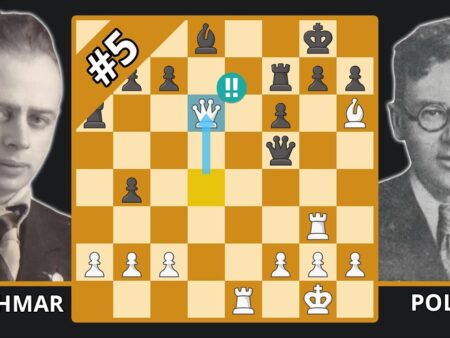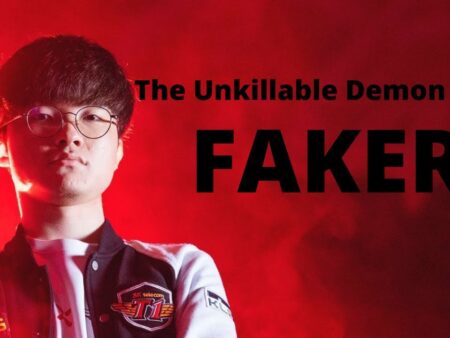With only three matches remaining, the four semi-finalists are on the cusp of European club football`s most coveted trophy. At this advanced stage, past struggles on the path to the semi-finals matter less; every team has a genuine opportunity. None of the remaining sides – Arsenal, Barcelona, Inter, or Paris Saint-Germain – enter their final games as significant underdogs, and it seems quite possible that most, if not all, could finish May as European champions.
Conversely, none of these teams are without imperfections. Every single one has suffered at least one defeat in the competition so far. Three-quarters of the remaining field might have finished second, third, and fourth in the Champions League`s group stage, yet the team that narrowly qualified for the knockout playoffs on the final day is considered just as likely to win as any other. This suggests a remarkably well-balanced set of contenders.
So, what factors might tilt the scales towards victory or defeat for these teams? Let`s explore their key strengths and weaknesses below.
1. Arsenal
Why they will win the Champions League: Defense wins titles
While another team still in the competition, Inter, has conceded fewer goals, no team limits opposition chances in front of goal as effectively as Arsenal. Across 12 games, they have allowed opponents shots with an average of just 0.69 non-penalty expected goals (npxG) per game. By almost every defensive metric, Arsenal`s backline is elite. They permit opponents only 16.4 touches per game in their penalty area, nearly five fewer than any other team remaining, and concede a mere 10.3 shots per game. This impressive record holds even after facing Real Madrid`s potent attack, which managed zero expected goals until a defensive error by William Saliba presented Vinicius Junior with a clear chance.
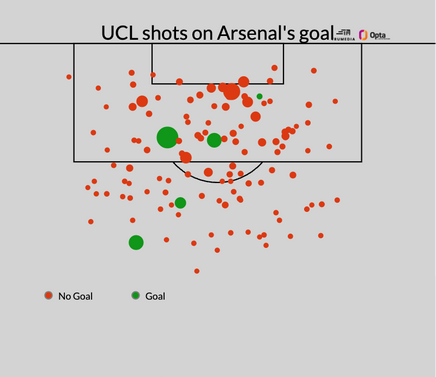
The long-standing adage is that defense secures championships, and this rings particularly true in the Champions League. Over the past six seasons, Real Madrid is the only club to have won the competition while allowing more than one npxG per game. Only four teams in that period have allowed 0.7 npxG or less; two of them reached the final in 2021, and another was the Manchester City side that missed penalties against Real Madrid in the 2024 quarterfinals.
Why they won`t win the Champions League: Scoring hot streak cools down
Arsenal are undoubtedly a highly effective unit, and like most teams at this stage, it`s easier to build a case for them winning than losing. Beyond a general feeling that they might need more experience at this level and lingering concerns about the absence of a central forward (concerns that have lessened since Bukayo Saka`s return), there aren`t many clear issues. However, if there is a potential vulnerability, it might be that they have significantly outperformed their expected goals from the chances they`ve created.
Their 22.82 xG has translated into 30 goals; no other team left has added more shooting goals (calculated as the post-shot value minus the pre-shot value). Arsenal have been scoring with exceptional efficiency in this competition, from Declan Rice`s rare free-kick brace to Ethan Nwaneri`s stunning strike. Statistically, their scoring output ought to regress closer to the expected mean in the long run, though of course, there`s no guarantee this balance must occur within the remainder of the tournament. Conversely, this is also a team that has demonstrated it can generate over two xG in major cup games and still fail to score. Mikel Arteta will be hoping that doesn`t happen again.
2. Barcelona
Why they will win the Champions League: They have the best player
A testament to Barcelona`s strength is that you might not immediately know which player I`m referring to. Lamine Yamal? Perhaps too early. Robert Lewandowski? A strong contender, but injured. Pedri? Possibly. However, based on Champions League performance this season, the answer has to be Raphinha. The record for goal involvements in a single competition season belongs to Cristiano Ronaldo, who seemed to score multiple goals per game en route to 21 in 2013-14. With potentially three matches still to play, Raphinha currently has 19. While he`s had a few more games to accumulate this tally, it remains an astonishing achievement from the former Leeds player.
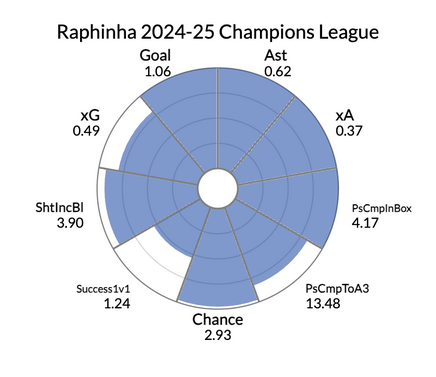
Raphinha leads the competition not only in overall goal involvements but also in assists and big chances created. Only two opponents faced so far – Monaco and Brest – have prevented him from having a direct impact on the scoreline. He is closing in on club legends. Two more goals will match Lionel Messi`s best European scoring season for Barcelona, and two more assists will tie both the club and Champions League record held by Luis Figo.
Why they won`t win the Champions League: Their high line gets pierced
Hansi Flick`s strategy since taking charge at Barcelona last summer involves a bold, maximalist approach inspired by Bundesliga football: an extremely high defensive line and aggressive pressing. The belief is that intense pressure from forwards and midfielders will prevent opponents from exploiting the space left behind. For the most part, this has been effective, particularly in La Liga, where its emphasis on athleticism has surprised a league often prioritizing technique.
In the Champions League, however, moments of vulnerability have appeared. Benfica managed to break through Barcelona by playing long balls to Vangelis Pavlidis and winning second balls. Borussia Dortmund used speed on the flanks to run past the offside trap and might have come even closer to overturning a four-goal deficit if not for misjudging some of those runs.
Barcelona`s defense can be breached. Their backline allows more through balls than any other team remaining in the competition. They have conceded more expected goals from counter attacks than Arsenal, PSG, and Inter combined.
3. Inter
Why they will win the Champions League: Recent experience
A regular presence in the knockout stages over the last four years, finalists in 2023, and a challenging opponent for Liverpool and Atletico Madrid in the other two instances, this Inter squad is well-acquainted with the demands of the Champions League. Over the past five years, 13 players in Simone Inzaghi`s roster have played 30 or more games in this competition. PSG has nine such players, Barcelona six, and Arsenal none.
Inzaghi has successfully leveraged a squad that hasn`t undergone radical changes. Eight players who started the final defeat to Manchester City in Istanbul are still part of the team, and seven of them were in the starting lineup that drew with Bayern Munich in the quarterfinal. This stable core has facilitated the integration of relatively younger and newer players like Yann Aurel Bisseck and Marcus Thuram, allowing them to make significant contributions. This is a team that appears ready and unwilling to shrink in the face of the major challenges ahead.
Why they won`t win the Champions League: They don`t create enough
Unfortunately for Inter, all that experience hasn`t yet made them look like a likely Champions League winner based on performance. While anything can happen when you`re just three games away from the prize, the evidence suggests they are a step behind the other contenders. A goal difference of +14 is respectable, but the fact they`ve only conceded five goals seems partly due to good goalkeeping by Yann Sommer and exceptionally poor finishing from their opponents. While there might be a reason why top strikers like Erling Haaland, Harry Kane, and Gabriel Jesus have had below-par finishing nights against Sommer, relying on this trend continuing against Barcelona is risky.
Crucially, Inter`s attack doesn`t seem to have the firepower of a championship side either. The six penalties they`ve been awarded (four converted) inflate their scoring output significantly. Fifteen non-penalty goals from 12 games doesn`t necessarily indicate future champions, nor does 1.36 npxG per game. In fact, that figure places them squarely in the middle of the 36 teams that started the Champions League. Their npxG difference, at 0.33 per game, is less than half that of the third-best team in that ranking, Barcelona, placing them as the 11th best team across the entire competition by this metric. Of course, some teams above them did not face as many top-tier opponents as the Italian champions. Still, the statistics so far do not strongly point towards Inter being the eventual champions.
4. Paris Saint-Germain
Why they will win the Champions League: The press
By now, you`re likely aware of the narrative suggesting a destiny for Parisian hands to lift the trophy in Munich at the end of May. With the departure of the “big three” superstars, Luis Enrique`s PSG seems to have evolved into a more cohesive “real team,” something observers haven`t seen since the Qatari takeover. This transformation is reflected in a playing style dictated by the midfield, rather than by three disconnected forwards, and a dynamic, interchangeable attack where players fluidly move together instead of prioritizing individual actions.

Most notably, this new PSG is defined by its play without the ball. Although the 2024-25 sample includes two more games than the previous season, the accompanying image demonstrates their significantly improved effectiveness in winning the ball back. Few teams press as intensely as Luis Enrique`s side.
Their 9.2 passes allowed per defensive action is the second lowest in the competition, trailing only Bayern Munich; just two years ago, this number was 13.5. No team in the entire competition averages more ball recoveries in the front two-thirds of the pitch than the French champions, who regain possession 31.1 times per game. According to Wyscout, no team wins more defensive duels.
Why they won`t win the Champions League: Too many bad shots
Similar to Arsenal, there isn`t an extremely obvious weakness in PSG`s profile (though Barcelona might have one, it`s worth noting that Flick`s team is arguably just as likely, if not more, to win than the others). Like any team, injuries in key positions, particularly at center forward or full-back, could derail them. Assuming full fitness, however, one potential issue lies in their attack, a flaw that Arsenal, specifically, would likely look to exploit. If opponents successfully prevent PSG`s initial attacking thrusts, the team tends to resort to taking rather low-quality shots.
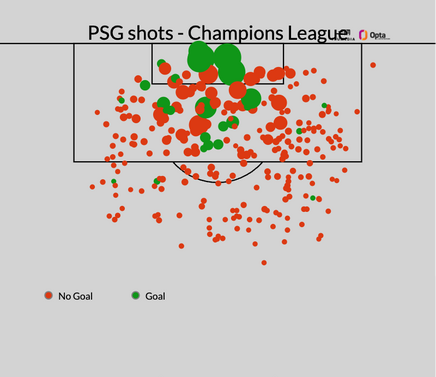
While the image above shows a good number of high xG opportunities, there`s also a considerable quantity of speculative shots. An average xG per shot of 0.107 is noticeably below the Champions League average, and their 34.8 percent of shots taken from outside the box is the highest proportion among the final four. No winner of this competition in the last six years has had a below-average xG per shot. More worryingly, in their big matches, the quality of shots has declined. Against Liverpool and Aston Villa, their xG per shot dropped to 0.087. When shots like those from Khvicha Kvaratskhelia or Desire Doue fly in, no one complains, but a consistent diet of hopeful long-range attempts could mean Arsenal have executed their defensive plan perfectly in the semi-finals.
